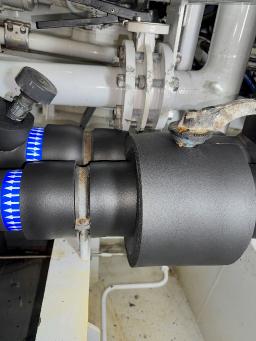

In the world of shipbuilding and offshore platforms, the importance of marine insulation cannot be overstated. It plays a vital role in ensuring both safety and operational efficiency by minimizing the environmental impact on ships and platforms. For companies in the marine services industry, understanding the multifaceted benefits of proper insulation is crucial for maximizing performance while reducing costs.
The marine industry, especially in shipbuilding and offshore construction, demands robust solutions to address extreme weather conditions, fluctuating temperatures, and various other operational challenges. Marine insulation serves as a strategic component to optimize energy consumption, protect structural integrity, and enhance overall performance.
Marine insulation is an essential element in the design and construction of ships and offshore platforms. This type of insulation helps mitigate the damaging effects of extreme temperatures, noise, and vibration—common issues encountered in maritime environments. By effectively managing thermal energy, marine insulation ensures that ships and offshore rigs remain efficient, comfortable, and safe under challenging operational conditions.
One of the most significant advantages of using marine insulation is its ability to improve energy efficiency. Ships, for example, rely on efficient fuel consumption to reduce operating costs and minimize their carbon footprint. Proper thermal insulation can help regulate temperatures inside the vessel, reducing the need for excessive air conditioning or heating. In turn, this reduces fuel consumption and operational costs, which is a major concern for marine businesses aiming to stay competitive in a constantly evolving industry.
For offshore platforms, particularly those operating in colder regions or deep-water environments, insulation also protects against heat loss in critical areas such as pipes, tanks, and machinery. By maintaining optimal temperatures in these parts of the platform, the insulation can help ensure smooth and uninterrupted operations.
Marine environments are notorious for their harsh conditions. Exposure to saltwater, high humidity, and fluctuating temperatures can lead to the corrosion and degradation of materials. Marine insulation not only helps maintain the structural integrity of ships and platforms by protecting metal surfaces from rust and corrosion but also improves the overall comfort of onboard crews.
With the right insulation materials, ships can minimize heat transfer, keeping cabins, control rooms, and living spaces cooler in the summer and warmer in the winter. This, in turn, enhances the well-being of the crew, ensuring that they remain focused and productive while working in an environment that can be both physically demanding and mentally taxing.
In addition to thermal insulation, marine services also require soundproofing and vibration damping solutions. The constant noise and vibration aboard ships and offshore platforms can be both disruptive and dangerous. Excessive noise, whether from engines, machinery, or the surrounding environment, can negatively impact the mental and physical health of the crew.
Marine insulation can effectively absorb and reduce noise levels, providing a quieter working environment. Similarly, vibration reduction is critical for preventing structural damage and ensuring the longevity of critical machinery. By incorporating effective insulation strategies into shipbuilding and offshore platform designs, operators can significantly enhance both safety and crew comfort.
The selection of insulation materials in marine environments varies depending on the specific needs of the vessel or platform. The two primary types of marine insulation are thermal insulation and acoustic insulation. Each serves a unique purpose, but together, they work to create a more efficient and durable structure.
Thermal insulation materials are used to reduce heat transfer, either by preventing heat loss or by keeping heat out. In shipbuilding, this type of insulation is critical for maintaining a stable internal environment. For instance, cold storage areas, machinery spaces, and cabins benefit significantly from thermal insulation to maintain their ideal temperature.
Materials like fiberglass, rock wool, and foam are common choices for thermal insulation in marine services. They offer high thermal resistance and are often fire-resistant, which is essential in mitigating risks in maritime settings.
The importance of reducing noise pollution cannot be ignored in shipbuilding. Marine insulation materials designed for acoustic purposes absorb sound waves and prevent noise from traveling through the structure. These materials are commonly used in engine rooms, exhaust systems, and other high-noise areas to protect the crew and ensure the equipment operates smoothly without disturbing the working environment.
Materials such as soundproofing foam and rubber-based products are often employed to dampen vibrations and reduce noise on vessels and platforms.
As the global maritime industry pushes toward sustainability, the importance of eco-friendly materials in shipbuilding and offshore construction has grown. Marine insulation contributes to this movement by offering several environmental benefits.
As mentioned, marine insulation helps reduce energy consumption by maintaining more consistent internal temperatures. This energy-saving effect directly correlates with reducing carbon emissions from fuel-powered vessels and platforms. By decreasing energy demand, marine insulation reduces the carbon footprint of ships and offshore platforms, helping businesses comply with increasingly stringent environmental regulations.
Furthermore, insulation materials themselves are increasingly being designed with sustainability in mind. Manufacturers are now creating products made from recyclable and non-toxic materials that have a minimal impact on the marine environment. This shift towards green materials supports the marine industry’s broader commitment to reducing its ecological footprint.
In summary, marine insulation plays an integral role in the functionality, safety, and environmental impact of ships and offshore platforms. The benefits extend far beyond temperature regulation and comfort, providing substantial advantages in terms of energy efficiency, structural protection, and noise reduction. For companies operating in marine services, investing in high-quality marine insulation is a strategic move that can lead to long-term savings, operational reliability, and a commitment to sustainability.
By adopting advanced insulation technologies, the marine industry can improve its efficiency, enhance crew well-being, and meet the growing demand for eco-conscious solutions. With these factors in mind, the importance of marine insulation will continue to be a cornerstone of shipbuilding and offshore construction in the years to come.
| No comments yet. Be the first. |